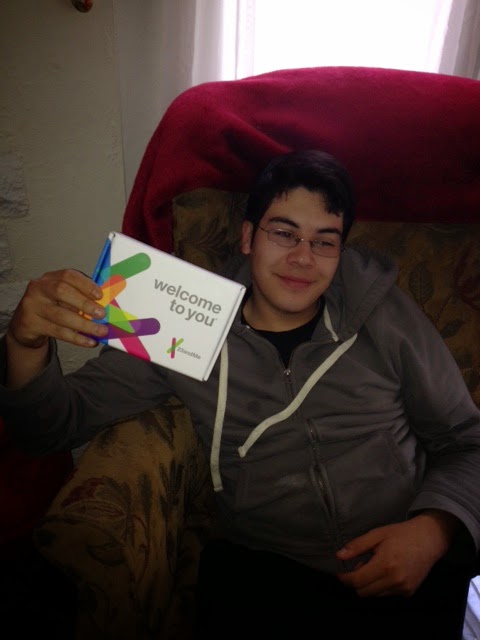Why Test Your Child's DNA?
My son, Matt, posing in this picture, is 20 years old and until last year was unaware of any ethnicity on my side of the family. As we sat together for Easter dinner, Matt's girlfriend was joking about how when she first saw Matt, she thought he was Asian. Her whole family thought he was Asian as well.
Which then led me to remember that when Matt and I used to work together, many of our co-workers thought Matt was Latino. I guess as my son, he inherited my Generic Ethnic look (poor kid). He was almost as excited as I was last year to get my DNA results.
After Easter dinner, Matt waited the prescribed 30 minutes and spit into the tube provided by 23 and Me. I registered Matt's DNA kit and then shipped it off yesterday to await the results (23 and Me states it should take 3 to 4 weeks).
My research goals in testing Matt's DNA are as follows:
1. To find my biological father's family (Matt's grandfather's family)
2. To confirm Matt's ethnicity, my own and my husband's through Matt's DNA
3. To be able to phase Matt's DNA
Genetic genealogy is the latest trend to confirm family pedigrees or break through walls where the paper trail gets iffy. Richard Hill, author of Finding Family, speaking to adoptees and others with unknown origins in Adoption Reunion in the Social Media Age, states,
What is phasing?
"Phasing is the process of trying to determine which DNA came from the mother, and which came from the father. The term is usually applied to types of DNA that recombine, such as autosomal DNA or the X-chromosome. The benefit of phasing is being able to identify which ancestor a segment was inherited from"
(http://www.isogg.org/wiki/Phasing)
As a family, we are excited to get Matt's DNA results as my husband, Mark's, side of the family has only family legends as to their family background. As an adoptee, I actually have a paper trail on my maternal side; whereas my husband does not. This is not uncommon for people whose families have lived in the U.S. for generations.
Mark's family legends consist of Irish, English, American Indian and German. We will soon find out!
For more information on which test might be right for you or your child, go to Richard Hill's DNA Testing Advisor.
April 25, 2014 is National DNA Day -- I have heard that the major DNA testing companies will be having great sales on that day!
Which then led me to remember that when Matt and I used to work together, many of our co-workers thought Matt was Latino. I guess as my son, he inherited my Generic Ethnic look (poor kid). He was almost as excited as I was last year to get my DNA results.
After Easter dinner, Matt waited the prescribed 30 minutes and spit into the tube provided by 23 and Me. I registered Matt's DNA kit and then shipped it off yesterday to await the results (23 and Me states it should take 3 to 4 weeks).
My research goals in testing Matt's DNA are as follows:
1. To find my biological father's family (Matt's grandfather's family)
2. To confirm Matt's ethnicity, my own and my husband's through Matt's DNA
3. To be able to phase Matt's DNA
Genetic genealogy is the latest trend to confirm family pedigrees or break through walls where the paper trail gets iffy. Richard Hill, author of Finding Family, speaking to adoptees and others with unknown origins in Adoption Reunion in the Social Media Age, states,
"If your biological family had a few generations of American roots, you will almost certainly discover previously unknown cousins from your biological family tree. From this new information, you can inch your way down the branches of that tree and finally have a chance of identifying birth parents and siblings."I only recently learned that by testing my biological son's DNA, that his DNA could then be phased.
 |
| Photo credit: www.chromosomechronicles.com |
What is phasing?
"Phasing is the process of trying to determine which DNA came from the mother, and which came from the father. The term is usually applied to types of DNA that recombine, such as autosomal DNA or the X-chromosome. The benefit of phasing is being able to identify which ancestor a segment was inherited from"
(http://www.isogg.org/wiki/Phasing)
Chris Baer, adoptive father who was interviewed for this article in the The Washington Times, explains why he decided to DNA test his minor son:
"My son, adopted as a baby from a rural orphanage in central Vietnam, was given no information whatsoever about his birth parents, or even his ethnicity. Were his birth parents tall? Short? Musical? Athletic? Were they even Vietnamese? (After all, he did look a little Caucasian as a baby.)
Locating his birth family is a daunting and very likely impossible task, but there is another option: DNA testing.
Some inexpensive genetic tools have matured in the past two or three years which will help answer some basic questions every adoptee and his family asks. A cheek swab can now yield volumes of accurate information about one’s heritage and health history. While it won’t provide all the answers, it can begin to close the knowledge gap between adoptees and those of us who know our birth parents."
As a family, we are excited to get Matt's DNA results as my husband, Mark's, side of the family has only family legends as to their family background. As an adoptee, I actually have a paper trail on my maternal side; whereas my husband does not. This is not uncommon for people whose families have lived in the U.S. for generations.
Mark's family legends consist of Irish, English, American Indian and German. We will soon find out!
For more information on which test might be right for you or your child, go to Richard Hill's DNA Testing Advisor.
April 25, 2014 is National DNA Day -- I have heard that the major DNA testing companies will be having great sales on that day!




Comments
Post a Comment